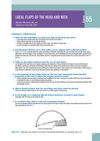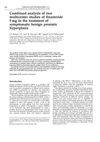 1 citations,
May 2022 in “Pharmaceutics”
1 citations,
May 2022 in “Pharmaceutics” Tea seed oil in nanostructured carriers stimulates hair growth and feels less greasy when applied.
 July 2012 in “Springer eBooks”
July 2012 in “Springer eBooks” The document concludes that proper diagnosis and treatment of nonscarring alopecias can improve quality of life and hair regrowth is possible as the hair follicle remains intact.
 2 citations,
September 2020 in “Biomedical materials”
2 citations,
September 2020 in “Biomedical materials” Recombinant keratin materials may better promote skin cell differentiation than natural keratin.
 1 citations,
January 2010 in “Elsevier eBooks”
1 citations,
January 2010 in “Elsevier eBooks” The document concludes that local flaps are effective for reconstructive surgery in the head and neck, offering good skin match and function.
 30 citations,
August 1992 in “The Journal of Clinical Endocrinology and Metabolism”
30 citations,
August 1992 in “The Journal of Clinical Endocrinology and Metabolism” Finasteride doesn't affect hormone levels in normal men.
 6 citations,
August 1996 in “The Journal of Clinical Endocrinology and Metabolism”
6 citations,
August 1996 in “The Journal of Clinical Endocrinology and Metabolism” MK-386 and finasteride together effectively reduce DHT levels, potentially treating acne and male pattern baldness.
 195 citations,
February 2007 in “The Journal of Clinical Endocrinology and Metabolism”
195 citations,
February 2007 in “The Journal of Clinical Endocrinology and Metabolism” Dutasteride and finasteride may reduce sperm count and volume but don't affect movement or shape; effects are reversible after stopping.
 142 citations,
August 2007 in “Journal of The American Academy of Dermatology”
142 citations,
August 2007 in “Journal of The American Academy of Dermatology” New 5% minoxidil foam effectively promotes hair growth and is safe for use.
 108 citations,
February 2008 in “The Journal of urology/The journal of urology”
108 citations,
February 2008 in “The Journal of urology/The journal of urology” Inhibiting 5α-reductase can help reduce prostate cancer risk and improve treatment.
 86 citations,
March 1993 in “Toxicology and Applied Pharmacology”
86 citations,
March 1993 in “Toxicology and Applied Pharmacology” Finasteride affects male rat genitalia development, causing abnormalities during specific pregnancy days.
 34 citations,
July 2011 in “Journal of Dermatological Treatment”
34 citations,
July 2011 in “Journal of Dermatological Treatment” Curcuma aeruginosa extract combined with minoxidil effectively treats male-pattern baldness.
 22 citations,
October 2001 in “Biochemical Pharmacology”
22 citations,
October 2001 in “Biochemical Pharmacology” GI198745 is more potent and longer-lasting than finasteride, potentially better for treating hair loss.
 19 citations,
January 2016 in “Annals of Dermatology”
19 citations,
January 2016 in “Annals of Dermatology” Dutasteride is safe and effective for treating hair loss, but may decrease libido.
 7 citations,
January 2018 in “Reproduction”
7 citations,
January 2018 in “Reproduction” Inhibiting 5α-reductase increases progesterone levels in late pregnant mares.
 218 citations,
December 2011 in “Advances in Urology”
218 citations,
December 2011 in “Advances in Urology” The document concludes that the 5 alpha-reductase enzymes are important in steroid metabolism and related to various human diseases, with inhibitors used to treat conditions like male pattern baldness and prostate issues.
 57 citations,
July 2016 in “The Journal of Sexual Medicine”
57 citations,
July 2016 in “The Journal of Sexual Medicine” 5α-reductase inhibitors increase the risk of sexual dysfunction, especially in men with enlarged prostate.
 49 citations,
October 2017 in “Nutrients”
49 citations,
October 2017 in “Nutrients” Equisetum debile extract, especially the ethyl acetate type, may be a promising natural ingredient for anti-hair loss products.
 46 citations,
October 1999 in “Journal of The American Academy of Dermatology”
46 citations,
October 1999 in “Journal of The American Academy of Dermatology” Finasteride effectively treats male pattern hair loss with a 1 mg daily dose.
 44 citations,
January 2007 in “Biological & pharmaceutical bulletin”
44 citations,
January 2007 in “Biological & pharmaceutical bulletin” Black pepper leaf extract contains compounds that can block testosterone effects and promote hair growth.
 38 citations,
January 2002 in “Biological & Pharmaceutical Bulletin”
38 citations,
January 2002 in “Biological & Pharmaceutical Bulletin” Lygodii Spora extract may help treat hair loss by blocking a hair loss-related enzyme and promoting hair growth.
 37 citations,
January 2009 in “Sexual Development”
37 citations,
January 2009 in “Sexual Development” Fadrozole and Finasteride change frog sex ratios and cause intersex animals with altered gene expressions.
 35 citations,
October 2004 in “Biology of Reproduction”
35 citations,
October 2004 in “Biology of Reproduction” PNU157706 reduced rat sperm movement and fertility without affecting offspring health.
 29 citations,
July 2012 in “The Journal of Sexual Medicine”
29 citations,
July 2012 in “The Journal of Sexual Medicine” Rats had lasting erectile problems after stopping a certain medication.
![Synthesis of 5,6,6-[2H3]Finasteride and Quantitative Determination of Finasteride in Human Plasma at Picogram Level by an Isotope-Dilution Mass Spectrometric Method](/images/research/0026b639-99a8-455a-a986-c39aa65abfa9/small/2087.jpg) 20 citations,
December 1995 in “Journal of Chromatography B: Biomedical Sciences and Applications”
20 citations,
December 1995 in “Journal of Chromatography B: Biomedical Sciences and Applications” Accurate method measures finasteride levels in human plasma using gas chromatography-mass spectrometry.
 7 citations,
May 2015 in “General and Comparative Endocrinology”
7 citations,
May 2015 in “General and Comparative Endocrinology” Finasteride negatively affects fish reproduction and gonadal development.
 6 citations,
September 1997 in “Prostate Cancer and Prostatic Diseases”
6 citations,
September 1997 in “Prostate Cancer and Prostatic Diseases” Finasteride 5 mg effectively reduces urinary symptoms and PSA levels in men with enlarged prostates, with few sexual side effects.
 5 citations,
August 2018 in “Sexual Medicine Reviews”
5 citations,
August 2018 in “Sexual Medicine Reviews” 5α-Reductase inhibitors do not consistently increase testosterone levels in the blood.
 3 citations,
February 2021 in “Molecules”
3 citations,
February 2021 in “Molecules” A new method was created to test the effectiveness of Dihydrotestosterone (DHT) inhibitors, like finasteride and dutasteride, in human and fish cells. The results showed fish cells are more sensitive to these treatments, and dutasteride works better than finasteride in all tested cells.
 3 citations,
October 2015 in “Human Psychopharmacology-clinical and Experimental”
3 citations,
October 2015 in “Human Psychopharmacology-clinical and Experimental” Finasteride doesn't affect sleep spindles in men.
 2 citations,
May 2019 in “PubMed”
2 citations,
May 2019 in “PubMed” Oral finasteride and dutasteride may negatively affect erectile function in rats.
























![Synthesis of 5,6,6-[2H3]Finasteride and Quantitative Determination of Finasteride in Human Plasma at Picogram Level by an Isotope-Dilution Mass Spectrometric Method](/images/research/0026b639-99a8-455a-a986-c39aa65abfa9/small/2087.jpg)





